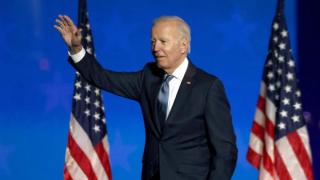Joe Biden’s apparent razor-thin victory over Donald Trump will not elicit the resounding sigh of relief from Australia’s strategic policy community many were expecting. If the opinion polls had been right, the narrative would have been clear: Gone was the president who didn’t believe in allies, global institutions or the rules-based international order. Back was the America we knew with an instinct to lead the world, work with multilateral partners and uphold liberal values at home and abroad.
Instead we’re left with the divided states of America. Biden might be commander-in-chief but with half a country unconvinced by his agenda to restore US leadership and the liberal international order. Much like Barack Obama, he’d be a centrist Democrat in an internationalist White House that might find itself frequently at loggerheads with a Republican Senate and its power of the purse. Australia’s outlook is uncertain. Given the president’s latitude on foreign policy, we would expect a return to steady alliances, multilateral diplomacy, investment in America’s economic-technological strength and a competitive but sensible strategy on China and the Indo-Pacific.
With a debilitating national deficit, declining defence spending and a likely expansion of international and domestic commitments under Biden, paying for reinvigorated US global leadership would be next to impossible.
But with a debilitating national deficit, declining defence spending and a likely expansion of international and domestic commitments under Biden, paying for reinvigorated US global leadership would be next to impossible. Trying to do so risks distracting a Biden administration from prioritising our part of the world.
Canberra will need to keep stepping up its own leadership contributions in the Indo-Pacific, working with like-minded friends to pool resources and sustain US attention on our collective Indo-Pacific priorities.
Biden’s foreign policy team doesn’t need to be sold on the need to compete with China for a stable and rule-governed region. Leading advisers such as Michele Flournoy and Ely Ratner agree with the Trump administration’s focus on “strategic competition” and the need to strengthen US military deterrence in the Western Pacific. Changes to US Indo-Pacific strategy that Biden would implement are likely to be in Australia’s interests.
Rather than squeezing US allies over crippling defence burden-sharing demands or forcing regional countries to make zero-sum choices on China policy, Biden would work with partners as “regional order enhancers” across the defence, geoeconomic, trade, diplomatic, technology and developmental landscape. This is a smarter way to compete with China’s multidimensional coercion and accords with Australia’s expanding foreign and defence policy agenda.
Rather than squeezing US allies over crippling defence burden-sharing demands or forcing regional countries to make zero-sum choices on China policy, Biden would work with partners as “regional order enhancers” across the defence, geoeconomic, trade, diplomatic, technology and developmental landscape.
The Biden team is clear-eyed about Beijing’s intentions and looks set to advance everything from freedom of navigation operations to co-ordinating counter-foreign interference and geo-economic measures. It would push this agenda in parallel with efforts to return the US-China relationship to a modicum of stability. Co-operation on climate change, international trade and other matters of global governance would be embraced again but wouldn’t come at the expense of Washington’s commitment to strategic competition.
But problems would begin for Australia when this sensible Indo-Pacific strategy met the reality of Biden’s domestic and global foreign policy ambitions, fast declining resources and a gridlocked congress. Beyond his Asia hands, Biden’s foreign policy team has a strong trans-Atlantic orientation that is likely to pull the US towards prioritising NATO repair and standing up to Russian transgressions. This — coupled with Democrats’ belief that Biden must restore the liberal international order and promote democratic values globally — could sidetrack the prosecution of a robust Indo-Pacific strategy.
While the US can invest in European and Asian security simultaneously, its shrinking pool of national resources imposes constraints. Following trillions of dollars in COVID-19 stimulus and lost revenue the US debt is likely to reach 98 per cent of gross domestic product by the end of this year, the highest since World War II. The scale of this economic fallout combined with a Republican Senate is likely to hail the cynical return of deficit politics and austerity.
While Trump claimed he’d presided over a huge increase in military spending, his administration achieved the bipartisan target of 3-5 per cent real growth only once despite support from congressional Republicans. Now, with Democrats rightly calling for more investment in “butter over guns”, and with next year’s defence budget projected to decline by 2 per cent, a Biden administration would have to make tough trade-offs.
Although Biden’s Indo-Pacific plans are a win for Australia, his apparent narrow victory and ambitious agenda will collide with significant resource trials at home and abroad. Australia and our regional partners will need to continue offsetting the shortfalls in US strategy and resources to shore-up a stable balance of power in the region even as we work with Biden’s Asia hands to press our case as to why the Indo-Pacific deserves pride of place in US strategy.







